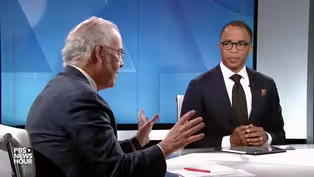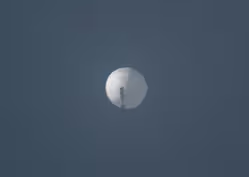
House committee leaders discuss U.S.-China tensions
Clip: 2/3/2023 | 9m 43sVideo has Closed Captions
House committee leaders discuss surveillance balloon, U.S.-China tensions
Beyond headlines about a Chinese surveillance balloon and the Secretary of State's canceled trip to Beijing lies the broader relationship between the world's largest economies. Nick Schifrin spoke with two leaders of the House Select Committee on the Strategic Competition Between the United States and the Chinese Communist Party about the U.S. and China competing for influence on many fronts.
Problems playing video? | Closed Captioning Feedback
Problems playing video? | Closed Captioning Feedback
Major corporate funding for the PBS News Hour is provided by BDO, BNSF, Consumer Cellular, American Cruise Lines, and Raymond James. Funding for the PBS NewsHour Weekend is provided by...

House committee leaders discuss U.S.-China tensions
Clip: 2/3/2023 | 9m 43sVideo has Closed Captions
Beyond headlines about a Chinese surveillance balloon and the Secretary of State's canceled trip to Beijing lies the broader relationship between the world's largest economies. Nick Schifrin spoke with two leaders of the House Select Committee on the Strategic Competition Between the United States and the Chinese Communist Party about the U.S. and China competing for influence on many fronts.
Problems playing video? | Closed Captioning Feedback
How to Watch PBS News Hour
PBS News Hour is available to stream on pbs.org and the free PBS App, available on iPhone, Apple TV, Android TV, Android smartphones, Amazon Fire TV, Amazon Fire Tablet, Roku, Samsung Smart TV, and Vizio.
Providing Support for PBS.org
Learn Moreabout PBS online sponsorshipAMNA NAWAZ: Beyond today's headlines about an apparent surveillance balloon and Secretary Blinken's canceled trip to Beijing lie the much broader relationship between the world's two largest economies.
The U.S. and China are competing for influence on many fronts across the world.
Here again is Nick Schifrin.
NICK SCHIFRIN: To better focus the U.S. government's efforts to confront China, the new Congress created a new panel to examine the relationship, the Select Committee on the Strategic Competition Between the United States and the Chinese Communist Party.
With me now are the new committee's two leaders, Republican Chairman Mike Gallagher of Wisconsin and Democratic Ranking Member Raja Krishnamoorthi of Illinois, for their first joint interview.
Gentlemen, thank you very much.
Welcome to the "NewsHour."
Chairman Gallagher, let me start with you on the news of the day.
Defense officials told congressional staffers today that the balloon entered continental U.S. airspace on January 31.
Do you believe they could have and should have shot this balloon down safely at that point?
REP. MIKE GALLAGHER (R-WI): Yes, I do, particularly if we were tracking it as it transited over the Aleutian Islands in Alaska, I don't think there's any serious concern about debris in that area.
Furthermore, I don't know why we didn't have the same ability to shoot it down over sparsely populated areas of Canada, in partnership with our allies in Canada, or even Montana -- Montana.
And if the Pentagon is telling us that they don't have this capability, well, then that's a capability we absolutely need to develop going forward.
And we need to be using our defense budget in order to develop that capability.
NICK SCHIFRIN: Ranking Member, Chairman Milley today told congressional officials that DOD needed a 20-mile-by-20 mile box to safely bring this down, and it wasn't safe to bring it down, for fear of some kind of civilian casualties on the ground.
Do you agree with that?
REP. RAJA KRISHNAMOORTHI (D-IL): I think we should defer to the military leaders, like Chairman Milley, as well as the head of the Northern Command.
I think that they also have pointed out that this particular balloon is no longer collecting intelligence, perhaps because of countermeasures.
And then, at the end of the day, not -- there's the risk, obviously, of the debris field injuring somebody or causing property damage.
But we also, in my opinion, want to preserve the tech.
In a lot of cases -- and both Mike and I are members of the Intelligence Committee as well -- we want to be able to know exactly what the technological capabilities are of the Chinese Communist Party.
So preserving that technology and being able to learn more about it is invaluable as well.
NICK SCHIFRIN: Ranking Member, sorry, let me just make sure I understand.
You believe that they could have brought the balloon down safely and preserved the tech?
REP. RAJA KRISHNAMOORTHI: If they can do that, I think they will -- they will probably do everything they can to make that happen.
Perhaps it will lose altitude and in a sparsely populated area of the country and thank will be able to recover it, and then we can examine it.
And then I'm sure the Chinese will want it back.
And we will say, we will return it upon determining that it's proper for weather purposes at the appropriate time.
NICK SCHIFRIN: Chairman Gallagher, U.S. officials telling me that they were concerned about sending Secretary Blinken to Beijing while the balloon was over U.S. airspace.
Do you believe they made the right decision in postponing his trip?
REP. MIKE GALLAGHER: I do.
I called for it this morning.
And I think he should just cancel the trip, as opposed to a postponement.
But maybe that's semantics.
I think the next time we meet, the Chinese officials should come to America.
And I think we deserve an apology for this violation of U.S. sovereignty.
I think this tells us something fundamental about the regime we're dealing with here.
And just remember the way in which Chinese diplomats acted in the first meeting that they had with Secretary Blinken in Alaska, berating them, talking about the horrible human rights record in America.
Remember what they did to Wendy Sherman.
So it's definitely in their playbook to do something like this in order to embarrass our diplomats.
And the optics of a grip-and-grin with Xi Jinping, I think, just would have looked bizarre so soon after this incident.
So they made the right call.
And I think it kind of gets to the core mission that we have on the Select Committee on China.
We believe our foreign policy is stronger when Republicans and Democrats are working together.
It's why I'm so thrilled and couldn't be more excited to work with Raj.
We have a long history of working together on foreign policy issues.
I have a profound respect for his intellect.
I know we have a shared understanding of the ideological, economic and military threat posed by the Chinese Communist Party.
So we're really excited to work together on the preeminent foreign policy challenge of our lifetime.
NICK SCHIFRIN: Ranking Member Krishnamoorthi, the administration says it wants to keep dialogue open with Beijing.
So why not send Secretary Blinken to read them the riot act, sure, during every meeting, but also discuss so many of the issues that your committee also is going to be discussing publicly?
REP. RAJA KRISHNAMOORTHI: Well, first of all, I want to thank Mike for those kind words.
I echo his sentiments about working with him, even though he is a Green Bay Packers fan.
But setting that aside for a moment, I have to say that, with regard to Secretary Blinken going to China, or the People's Republic of China, that would be a bad move, because what they did was, they violated American airspace and our sovereignty.
And that basically undermines their diplomatic overtures and questions -- and it calls into question the sincerity of those overtures.
So I think it's appropriate for Secretary Blinken to postpone the trip.
I'm sure that they're communicating in other ways right now.
And I hope that they make it very clear that this is completely unacceptable going forward, especially if we want to, as Secretary Blinken said, set a floor for our relationship, because it hasn't been improving the way it should be over the past couple of years.
NICK SCHIFRIN: Let me ask you both about Taiwan.
Yesterday, CIA Director Bill Burns said that, as a matter of intelligence, the U.S. believes Xi Jinping ordered his military to be prepared, not necessarily a decision, but prepared to invade Taiwan by 2027.
Chairman Gallagher, do you think the U.S. is willing to go to war over Taiwan and the American people are prepared to suffer the massive casualties that the military believes might happen if that war actually gets instigated?
REP. MIKE GALLAGHER: Well, I'm concerned that we are doing things counterproductive to the defense of Taiwan, such as trying to cut the size of the U.S. Navy.
The Biden administration's plan, defense plan, that they submitted last year would have had the Navy bottom out in 2027, at the worst possible point.
We're talking about our priority force in the priority theater.
So I have been concerned at the lack of urgency.
I believe we have entered the window of maximum danger.
We have obviously had a memo recently by an Air Force general saying that things could get frisky in 2025.
I'm worried about 2024, particularly after the Taiwanese elections in January of 2024.
So we need to be moving heaven and earth to restore our deterrent posture in the Indo-Pacific.
That being said, I salute the administration's recent announcement of enhanced basing agreements with both Japan and the Philippines.
That's a massive step forward.
What we're seeing the Japanese do on their own, increasing their defense spending, is a massive help to our efforts.
So those are good things.
We just need to be moving with a greater sense of urgency.
NICK SCHIFRIN: Ranking Member Krishnamoorthi, obviously, we hear a lot about the military not moving fast enough, despite some of the moves that Chairman Gallagher just mentioned.
But I also talk to some experts who fear the opposite, who say that, alongside the steps that the U.S. is taking in the Pacific, alongside the assurance given to allies, there needs to be more reassurance to Beijing and that, without that reassurance, Beijing could feel backed into a corner, leading to the very war that the U.S. is trying to deter.
What do you say to those voices?
REP. RAJA KRISHNAMOORTHI: I think that we should provide clear messages about red lines.
And I think that the Biden administration has been communicating those, just as President Biden did recently with Chairman Xi.
But, at the end of the day, the Chinese Communist Party is throwing its elbows in its neighborhood, whether it's in the South China Sea, whether it's with regard to Taiwan, or whether it's with regard to others who desperately seek an international rules-based order in that region of the world.
And that's why we have to work with our partners, friends and allies in the region to help supply their defensive needs and work with them for our collective mutual defense to deter aggression.
At the end of the day, we do not want a cold war.
We don't want a hot war.
We don't want open hostilities.
But the only way to do that is to prepare our mutual defense to discourage and deter aggression, and then, hopefully, work with Beijing on common long-term challenges, whether it's fighting climate change, or even bringing an end to the war in Ukraine.
But right now, with this balloon situation, it obviously exposes that the threat is real from the Chinese Communist Party.
NICK SCHIFRIN: Ranking Member Krishnamoorthi, Chairman Gallagher of the new House Select Committee on China, thank you very much to you both.
REP. MIKE GALLAGHER: Thank you.
REP. RAJA KRISHNAMOORTHI: Thank you.
Brooks and Capehart on the 2024 race for the White House
Video has Closed Captions
Clip: 2/3/2023 | 10m 37s | Brooks and Capehart on the state of the 2024 race for the White House (10m 37s)
Centers created along border of state banning abortion
Video has Closed Captions
Clip: 2/3/2023 | 3m 53s | Abortion providers create mobile centers along border of state banning procedures (3m 53s)
Chinese surveillance balloon over U.S. raises tensions
Video has Closed Captions
Clip: 2/3/2023 | 3m 29s | Chinese surveillance balloon over U.S. raises tensions in already strained relationship (3m 29s)
Global music fest helps musicians reach larger audiences
Video has Closed Captions
Clip: 2/3/2023 | 7m 11s | How a global music festival helps international musicians reach larger audiences (7m 11s)
Hiring surges, trends show men dropping out of labor force
Video has Closed Captions
Clip: 2/3/2023 | 6m 40s | Hiring surges but trends show more working-age men dropping out of labor force (6m 40s)
States fail to reach agreement on cutting water consumption
Video has Closed Captions
Clip: 2/3/2023 | 5m 31s | Western states that rely on Colorado River fail to reach agreement on cutting consumption (5m 31s)
Providing Support for PBS.org
Learn Moreabout PBS online sponsorship
- News and Public Affairs

FRONTLINE is investigative journalism that questions, explains and changes our world.

- News and Public Affairs

Today's top journalists discuss Washington's current political events and public affairs.












Support for PBS provided by:
Major corporate funding for the PBS News Hour is provided by BDO, BNSF, Consumer Cellular, American Cruise Lines, and Raymond James. Funding for the PBS NewsHour Weekend is provided by...





